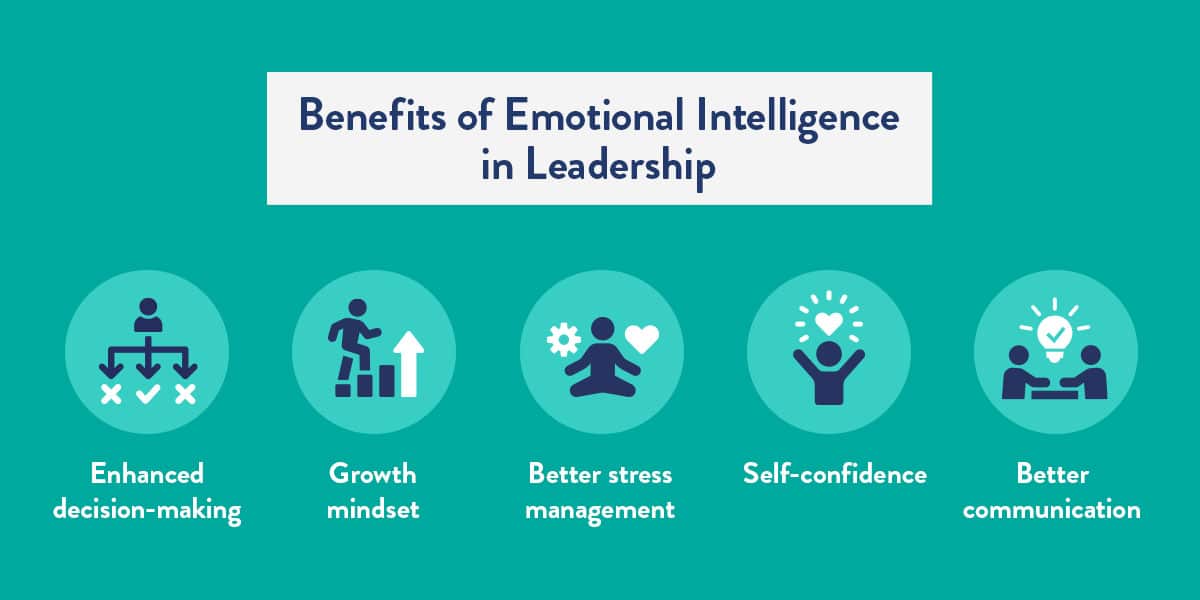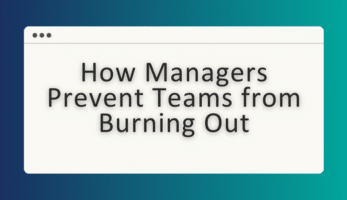Leadership
How to Improve Emotional Intelligence in Leadership

Your skills and characteristics helped lead you into executive management. The corporate world is dynamic — constantly shifting toward expansion and diversity. Improving your emotional intelligence as a leader is vital for contributing toward these growth areas. It is the foundation for helping your teams and company thrive under your guidance.
Learning how to improve emotional intelligence in leadership is an all-encompassing journey that involves deepening empathy, self-awareness and communication, ensuring your team is more inclusive.
Understanding Emotional Intelligence in Leadership
Emotional intelligence is a set of skills that allows you to understand and manage your emotions. It also enables you to better comprehend other people’s feelings.
Five core elements contribute to greater emotional intelligence:
- Self-awareness: Self-awareness is the ability to recognize your own strengths and weaknesses and have a good understanding of your character and personality. When you are self-aware, you can recognize your emotions, identify triggers and understand other perspectives more easily.
- Self-regulation: Self-regulating goes a step beyond self-awareness. It is the ability to understand your emotions and then manage your feelings, reactions and behaviors accordingly. Self-regulation is vital in the workplace as it can build resilience and help you cope with high-pressure situations. It is also an essential part of conflict resolution.
- Motivation: A commitment toward achieving goals is one of the standout characteristics of a leader. Additionally, your motivation inspires your team and can boost their performance. Motivation is also a significant part of emotional intelligence, as it’s integral to other traits like optimism, resilience and the drive to continuously improve oneself.
- Empathy: Empathy can often be a leader’s greatest tool. Understanding others’ feelings, thoughts and perspectives is key to forming positive interpersonal relationships with team members. Establishing these meaningful connections can improve employee engagement and make team members feel more valued and appreciated.
- Social aptitudes: The skills one uses to communicate with others form their social skills. These interactions can be verbal or nonverbal and include speech, facial expressions, body language, gestures and even written communication. Social skills are a key part of emotional intelligence, leadership and career advancement.
Benefits of Emotional Intelligence in Leadership
Emotional intelligence is integral to all areas of life, including your leadership position in the workplace. Honing the skills that increase and improve emotional intelligence benefits your leadership in the following ways:

- Enhanced decision-making: Decisions affect individuals, teams and companies at large, so making them carefully and choosing the best options is critical for good leadership. Improved emotional intelligence helps you better understand all the factors contributing to important conclusions, especially decisions related to team management.
- Growth mindset: Leaders with a high level of emotional intelligence often have an optimistic growth mindset that is difficult to attain otherwise. Creating an actionable growth plan for you and your team is far easier when you understand everyone’s strengths and weaknesses. You’ll be able to bring out the best in each person.
- Better stress management: Improving your emotional intelligence can help you develop healthier coping strategies and be a better problem solver. You can examine a situation or responses from your team for what it is and find healthy and effective ways to address stressful factors instead of letting them affect you.
- Self-confidence: Improving your emotional intelligence could be exactly what you need if you feel your self-confidence as a leader is lacking. With greater self-awareness and self-regulation, you can own your strengths, work on growth areas and respond accordingly to difficult situations with your team members — rather than taking conflicts or failures personally.
- Better communication: Emotional intelligence in leadership leads to stronger communication. It makes you better at sharing your views and expectations and at listening and responding accordingly.
Emotional Intelligence Leadership Training
You can apply the following actionable tips to improve your emotional intelligence to strengthen your leadership skills:
Observe and Evaluate Feelings and Responses
If you would like to enhance your self-awareness, keeping a log of your feelings can be extremely helpful after various interactions and situations at work. Jot down how you felt and responded to different interactions with different people.
How did you feel and respond when you were complimented, challenged, overwhelmed or bored? How did you treat different people in similar situations? In observing and evaluating your emotions and reactions, you can find patterns highlighting your strengths and weaknesses. This will give you valuable insights into where you can grow your emotional intelligence, such as being more empathetic or working on your social skills.
Practice Pausing
You can grow your self-regulating ability by setting a goal to pause intentionally before reacting at least once daily. Many times, reactions are instinctive — you may people-please, agree, disagree or lose your cool before you have processed your feelings. A good way to practice this is to pause before responding in meetings.
Practice Empathy
Empathy is one of the cornerstones of emotional intelligence and great leadership. Some people don’t want to be seen as overly empathetic in the workplace — especially if they are worried that team members would view it as a weakness or take advantage of it. Overcoming this mindset is the first key to growing your empathy and applying it to your leadership more effectively.
To practice empathy in the workplace, try incorporating the following:
- Be an active listener by focusing on what a team member is communicating and respond appropriately with interest, concern, solutions or encouragement.
- Consider different perspectives during conflicts or conflict management.
- Address problems with solutions that help your team! Focus on how you can help your team grow and do better for themselves and the company.
- Validate concerns or experiences without necessarily agreeing with them. You can let team members know their perspectives are real and important, even if they aren’t correct.
Actively Make Your Team More Inclusive and Diverse
A sure way of improving your emotional intelligence as a leader is to surround yourself with capable people from diverse backgrounds. Without inclusion and diversity in the workplace, you may open your team up to discrimination, microaggressions, hostility and isolation — the opposite of what you want when improving emotional intelligence in leadership.
By leading an inclusive and diverse team, you can welcome different perspectives and learn how to respond to different needs accordingly.
Have Open Dialogue and Seek Feeback
An excellent leader holds themselves to a higher standard by inviting open dialogue and seeking feedback from their team members or co-workers. Open dialogue allows you to be challenged so you can grow as a leader and make the most informed and positive decisions for your company. By inviting feedback, you can also measure your growth in the various aspects of emotional intelligence.
Develop Your HR and Leadership Skills With Exude Human Capital

Exude Human Capital specializes in providing solutions that improve and develop your company’s leadership, human resources and Diversity, Equity, Inclusion & Belonging programs.
Our coaching and training solutions can help you improve your emotional intelligence and build your leadership skills. With our professional team and resources, you can enhance your strategies and performance.
Feel free to explore our resources or contact us to learn more about how we can build a formula for your company’s success.








